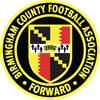
England DNA Foundation Phase Coaching Sessions For Players
Do you work with players aged 5-11? Are your coaching sessions appropriate to the age of the players? Here, Pete Sturgess, FA national lead for players aged 5-11, provides an insight into the England DNA Foundation phase project outlining a session structure perfect for young players.
The England DNA Foundation Phase resource has promoted the power of play in the development of our young players. One way to give immediate opportunities for the players to play and express themselves is at the beginning of the session.
Players will rarely arrive at the same time so whilst you wait for all players to get there organise small-sided games that resemble the pick-up games players might play in the street or at school.
You can organise the teams but it is just as easy to give some ownership and let the players sort things out. If I give the selection of teams over to the players I ask for two equal sides so that it is a close contest.
This is giving the players some responsibility to recognise and equal out the different abilities in the team. This is not easy so persevere with this approach and the players will understand what you want.
During this period you can go through the plan for the session in your head. You might have to adjust the numbers if players are absent and haven’t told you, or an extra player has turned up that you hadn’t expected. Whilst the players are engaged in their game you can get things clear in your head and get ready for the first activity.
One thing you must be prepared to do is this: if the arrival activity is a good contest and the players are motivated, on task, and really committed to the game - don’t stop it.
If you are getting some good returns and the players are practising some relevant things then keep it going and coach things as they happen in the game.
If you wanted to, you could drop out some individual challenges that wouldn’t affect the overall tempo of the game but would focus the minds of the players. This is great coaching. If you do want to have a focus to the session then practise a specific thing before putting the players back into games to see if they recognise where this bit fits with the game.
There is a mistaken view that if you increase the number of games that are played in training then there is no coaching done - the players play and the coach is a bystander. This is just not true. The game is used as a means to provide individual challenges for the players (these can be linked to strengths or areas to improve).
Rules or conditions can be added that challenge the players in a tactical capacity or a whole-part-whole approach can be used – this method sees the coach starting from a game and then moving to a very specific focus of practice before the players are invited to play again to demonstrate whether they can see where the practice focus fits into the game.
It is during these focus activities that technical detail can be given to help the player. Point of caution: if it is a technical issue then demonstrating the move is fine but you will be showing what works for you. The player’s version might look different but could be just as effective.
Look at the outcome: is the player’s technique effective? Because, if it is, even though it doesn’t look like yours, leave it alone and let the player refine it in line with the levels of success. This kind of self-regulation is important and you can be there to support and guide but encourage the player to reflect also.
Whatever approach you take, remember that the closer your practice resembles the demands of the game, the better preparation this is for the players. If you are doing a focus activity (hopefully in line with the England DNA) then include opposition, direction and relevant decision-making so that when you ask your players to take this practice into the game the jump is a very small one.
The above article first featured as part of the England DNA foundation phase project - a resource that provides regular video, theory and session plan content for coaches working with players between the ages of 5-12.
Here’s how you can access the England DNA foundation phase content:
Members
If you already have a Hive Learning account, you can access this area right now by clicking here.
Non-members
Creating your Hive Learning account is completely free and only takes a couple of minutes by visiting the FA sign-up page here.
Once you’ve created your account, search for England DNA Foundation Phase in the search bar to gain access to the group.










